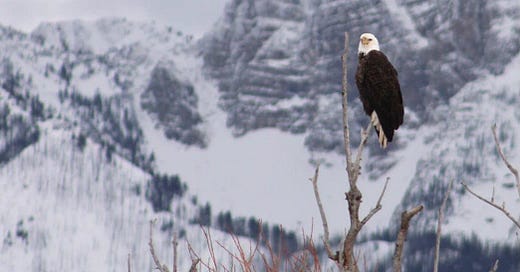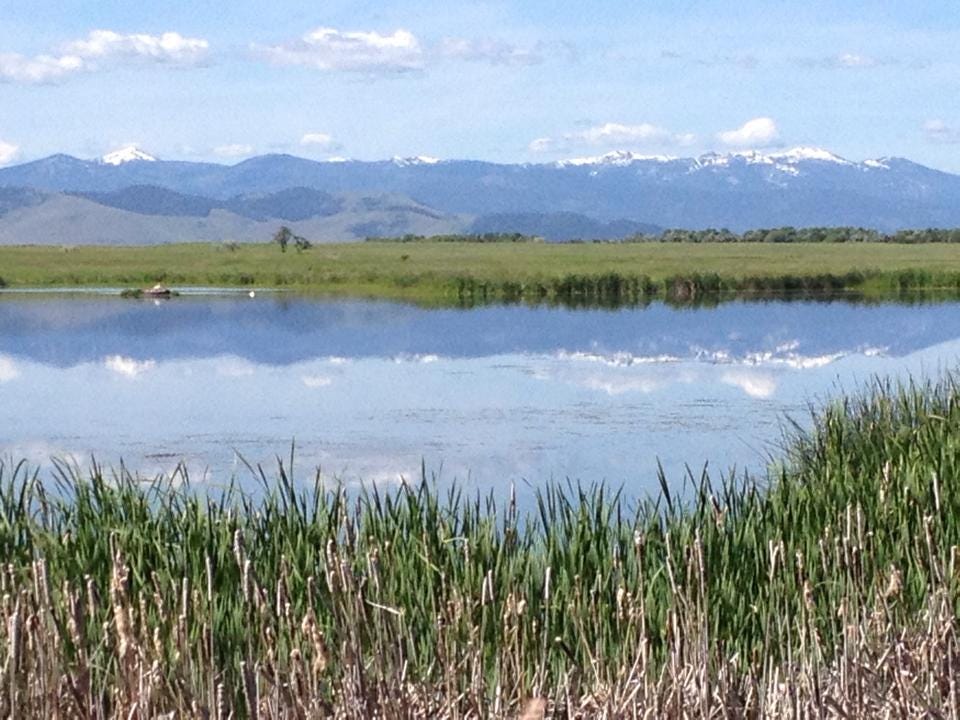North of where I live, the Ninepipe National Wildlife Refuge is a stunning expanse of water and 9,000-foot peak reflections and birds, so many birds. One huge reservoir is home to trumpeter swans and American pelicans, herons and eagles and all the small ones, nearby shorteared owls plus turtles and water-loving mammals like otters. Also, so many duck ponds!
Since forever, I believed these duck ponds were exactly what I thought I learned from the Roadside Geology of Montana. Called kettles, they’re places where chunks of ice left behind by glaciers embedded in the ground later melted, leaving a round pothole that filled with water and became the perfect place for diving ducks, Western painted turtles, and other water fauna.
I’ve learned this may not be the case. Rather, these ponds are likely “pingo ponds.” Pingo is from an Inuit word for “mound” and they occur frequently in areas of permafrost. Think of frost heave, when the ground absorbs water, freezes and sorta puffs up. Pingos begin as a lens of ice pushing the ground up, and later the internal water melts. The ground above the thawing lens then sinks downward, leaving walls of sediment that extend vertically. The central spaces fill with water and become ponds.
I thought about the difference between beginning one’s existence as an empty space, a vessel, and beginning as a complete, filled entity which later creates a space for others to live. They are both mothers of a kind, spaces where life is nurtured. But one starts as its own being, the other as a void.
It reminded me of a recent piece by Anne Helen Petersen on #TradWife culture, which she teases out to self-annihilation. She writes,
To embody ideal femininity is to serve others at all times, of course — but it is also to aspire to self-annihilation. The absence of desire, the absence of needs, the absence of resistance as you hollow out the self and replace it with the desires and needs of others.
I have read and had many conversations with other women about women’s erasure of ourselves in order to fulfill the needs — perceived and real — of other people. It’s what we are taught to do, even when we grow up in households of only women who are kicking ass every day and raising other females to do the same. I cannot explain my own compulsion but I feel it: provide, provide, provide, and be sure to sacrifice myself while I’m doing it or it doesn’t count.
This analogizes to the kettle pond, the kind that started as a chunk of ice melt. It is the creation of a space, seemingly from nothing, which must become home to other beings. It is like where women efface themselves until they are nothing, in order to be All Things to All People except herself. They exist only as a place characterized by whatever fills them, whether that is a spouse, children, or something else.
You might say, “but the pingo pond ends up the same way, a space for others to live and grow.” And yes, a pingo pond is also a pothole filled with water where ducks dabble and turtles on sunny logs stretch their necks to the sky.
But these ponds began as their own entities: a bulge in the earth, filled with their own soil and water, pushing up and out and saying I Am Here and This Is Me. Even as they sink, they retain berms of themselves all around, protecting what is theirs, and defining who they are. The berms grow over time as sediment builds along them. These ponds were never a nothing which simply existed to be filled with others’ needs and desires. Rather, they represent a life compressed into ore, one completed by its own essence, the minerals and elements and salts of its core being.
For so long I felt like the void that refracted others, a being that absorbed other beings and created myself from them. Now I intend to pull off a retroactive transformation, from the kettle to the pingo; to a container that’s uniquely me: created from earth that smells and tastes and sounds of me, tethered to gardens and growing things, also lifted to the sun and stars, with the wings of a bird soaring skyward over the dawning hills.






I look forward to these Tuesday reads. How on earth did this geology and psychology meet in your head? A usable metaphor is born. Pingo would be a good name for a game like Bingo only different, but you get to yell Pingo! When you get 5 elements in either direction.
Achingly beautiful. Your writing reminds me of my first encounters with Annie Dillard’s work.